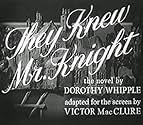"Mr. Knight" (Alfred Drayton) is the archetypal man made good. He walks to his first class railway carriage every morning fêted by the staff and the management. One morning he is prevented from treading on a banana skin on the steps by the struggling mill owner "Blake" (Mervyn Johns) and soon the two are inseparable. "Blake" is ambitious for success - for himself and his large family, and hopes his association with this successful man will bring him good fortune. Initially it does, and they move to big house and acquire the trappings of luxury - but as with anything that looks too good to be true, it usually is. Things take a turn for the worst and the friendship turns sour leaving "Blake" with quite an headache. This is a simple enough story of greed. Not necessarily of the venal sort. In the beginning "Blake" wants his money for his family - a laudable motive, no doubt. Like "Scrooge", though, his character finds the pursuit of wealth addictive. He gradually becomes subsumed by the need to make more, and more. Enough is never enough. When the bottom falls out of his dream, he is bereft - but not just of the cash, but of his integrity and his soul. His children are also quite an effective barometer of the toxicity of wealth too - not least the spoiled and selfish "Freda" (a strong performance from Joyce Howard) and his other daughter "Ruth" (Joan Greenwood). Like many British films made immediately post-WWII, it has a message to it and this well assembled cast delivers it clearly. For a Britain in 1946 - there are few quick wins.















